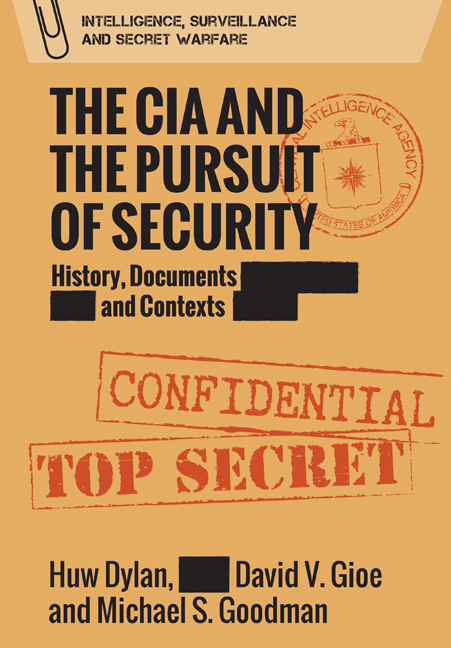Book contents
- Frontmatter
- Contents
- List of Documents
- Foreword
- Acknowledgements
- Introduction
- 1 Intelligence for an American Century: Creating the CIA
- 2 The Development of CIA Covert Action
- 3 A ‘Gangster Act’: The Berlin Tunnel
- 4 The CIA and the USSR: The Challenge of Understanding the Soviet Threat
- 5 Anglo-American Intelligence Liaison and the Outbreak of the Korean War
- 6 The CIA and the Bomber and Missile Gap
- 7 The CIA and Cuba: The Bay of Pigs and the Cuban Missile Crisis
- 8 The CIA in Vietnam
- 9 The CIA and Arms Control
- 10 The CIA’s Counter-Intelligence Conundrum: The Case of Yuri Nosenko
- 11 1975: The Year of the ‘Intelligence Wars’
- 12 Watching Khomeini
- 13 The CIA and the Soviet Invasion of Afghanistan
- 14 Martial Law in Poland
- 15 Able Archer and the NATO War Scare
- 16 The Soviet Leadership and Kremlinology in the 1980s
- 17 The CIA and the (First) Persian Gulf War
- 18 A Mole in Their Midst: The CIA and Aldrich Ames
- 19 ‘The System was Blinking Red’: The Peace Dividend and the Road to 9/11
- 20 Reckoning and Redemption: The 9/11 Commission, the Director of National Intelligence and the CIA at War
- 21 The ‘Slam Dunk’: The CIA and the Invasion of Iraq
- 22 The Terrorist Hunters Become Political Quarry: The CIA and Rendition, Detention and Interrogation
- 23 Innovation at the CIA: From Sputnik to Silicon Valley and Venona to Vault 7
- 24 Entering the Electoral Fray: The CIA and Russian Meddling in the 2016 Election
- 25 Flying Blind? The CIA and the Trump Administration
- Bibliography
- Index
22 - The Terrorist Hunters Become Political Quarry: The CIA and Rendition, Detention and Interrogation
Published online by Cambridge University Press: 24 September 2020
- Frontmatter
- Contents
- List of Documents
- Foreword
- Acknowledgements
- Introduction
- 1 Intelligence for an American Century: Creating the CIA
- 2 The Development of CIA Covert Action
- 3 A ‘Gangster Act’: The Berlin Tunnel
- 4 The CIA and the USSR: The Challenge of Understanding the Soviet Threat
- 5 Anglo-American Intelligence Liaison and the Outbreak of the Korean War
- 6 The CIA and the Bomber and Missile Gap
- 7 The CIA and Cuba: The Bay of Pigs and the Cuban Missile Crisis
- 8 The CIA in Vietnam
- 9 The CIA and Arms Control
- 10 The CIA’s Counter-Intelligence Conundrum: The Case of Yuri Nosenko
- 11 1975: The Year of the ‘Intelligence Wars’
- 12 Watching Khomeini
- 13 The CIA and the Soviet Invasion of Afghanistan
- 14 Martial Law in Poland
- 15 Able Archer and the NATO War Scare
- 16 The Soviet Leadership and Kremlinology in the 1980s
- 17 The CIA and the (First) Persian Gulf War
- 18 A Mole in Their Midst: The CIA and Aldrich Ames
- 19 ‘The System was Blinking Red’: The Peace Dividend and the Road to 9/11
- 20 Reckoning and Redemption: The 9/11 Commission, the Director of National Intelligence and the CIA at War
- 21 The ‘Slam Dunk’: The CIA and the Invasion of Iraq
- 22 The Terrorist Hunters Become Political Quarry: The CIA and Rendition, Detention and Interrogation
- 23 Innovation at the CIA: From Sputnik to Silicon Valley and Venona to Vault 7
- 24 Entering the Electoral Fray: The CIA and Russian Meddling in the 2016 Election
- 25 Flying Blind? The CIA and the Trump Administration
- Bibliography
- Index
Summary
After the national trauma of the attacks of September 11th, 2001, there was alarm in the intelligence community that al-Qa’ida was not done terrorising Americans with high-profile mass-casualty attacks in the homeland. In response, CIA requested that the George W. Bush administration provide it with expanded funding and authorities, in a focused mission to prevent follow-on attacks. As former Director of the National Clandestine Service (D/NCS) Jose Rodriguez memorably phrased the request: ‘We needed to get everybody in government to put their big boy pants on and provide the authorities that we needed.’ With smoke still billowing from lower Manhattan, the Bush administration was eager to oblige. In time, however, as this chapter will explore, the authorities granted to CIA–or CIA's interpretation and exercise of those authorities–would stretch CIA's relations with its political masters to the breaking point.
After the post-Cold War malaise, CIA had a new mission–one it would follow relentlessly–and a mandate to find the masterminds of 9/11 ‘dead or alive’, as President Bush put it. CIA wasted no time in retooling for a new fight. Working with military, interagency and law enforcement partners, CIA foiled several post-9/11 attacks by collecting, analysing and disseminating threat intelligence. Beyond refocusing on interagency partnerships with other elements of the US government, CIA also worked jointly with international partners, some of whom it had theretofore been unwilling to have deeper liaison relations with given other concerns, such as their human rights records. These ‘nontraditional liaison partners’ provided capabilities, resources and access to people and places that CIA did not have before 9/11, but also came with moral hazard that would prove difficult to navigate in practical and political terms.
To say that 9/11 changed the agency would be an understatement. As voiced by Cofer Black, a well-regarded career agency officer who served as Chief of the DCI Counterterrorist Center (C/CTC) between 1999 and 2002, ‘there was before 9/11 and after 9/11’. Indeed, the agency was placed on a war footing, and that meant new partners, new technologies (such as drones armed with precision missiles) and new rules for how to deal with what then-Defense Secretary Donald Rumsfeld called ‘the worst of the worst’ terrorists.
- Type
- Chapter
- Information
- The CIA and the Pursuit of SecurityHistory, Documents and Contexts, pp. 451 - 468Publisher: Edinburgh University PressPrint publication year: 2020



